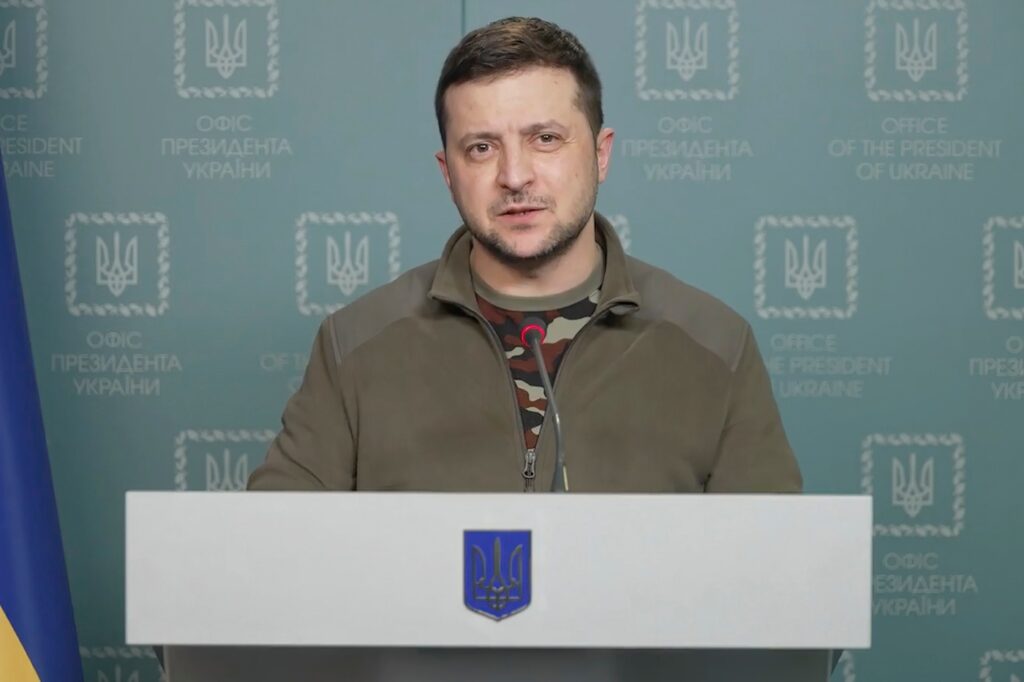
In September 1938, British Prime Minister Neville Chamberlain flew to Germany to negotiate with Adolf Hitler. Brushing off warnings from the leader of Czechoslovakia, Edvard Benes, that giving Germany the Sudetenland would decimate Czech defenses, Chamberlain reached an agreement with Hitler that did exactly that. Hitler declared that he had “no more territorial demands to make in Europe.” Chamberlain proclaimed that the deal was “Peace for our time.”
Six months later, in March 1939, Hitler’s troops took over the rest of Czechoslovakia. With Poland threatened next, Chamberlain made an agreement to defend Poland if Germany invaded. Hitler invaded Poland that September, and two days later, Britain declared war on Germany.
On Saturday, British Prime Minister Boris Johnson made an unannounced trip to Ukraine. The visit was first revealed on the Twitter account of Ukraine’s embassy to the United Kingdom. “Surprise,” the tweet read, accompanied by a winking emoji and a photograph of the prime minister deep in conversation with Ukrainian president Volodymyr Zelensky across a polished conference table.
The photo could have been captioned, “British Prime Minister Boris Johnson visits Kiev to compete for the Not Neville Chamberlain Award.”
Russia’s unprovoked invasion of Ukraine has clearly awakened the ghosts of World War II in many quarters.
On Wednesday, the presidents of Poland, Lithuania, Latvia and Estonia were in the Ukrainian capital to meet personally with Zelensky. At a joint news conference, Polish President Andrzej Duda said about Russia’s actions in Ukraine, “This is not war, this is terrorism.” The day before, President Joe Biden accused Russia of “genocide” in Ukraine, a statement that found favor with Ukraine’s president. “Calling things by their names is essential to stand up to evil,” Zelensky said.
This is all very different from the initial reaction by western leaders to Russia’s invasion of Ukraine. Biden said the world would likely take no action in response to a “minor incursion,” and Zelensky was offered an evacuation flight, which he famously answered by stating that he needed “ammunition, not a ride.” The Ukrainians’ fierce self-defense and their success in holding their capital city have changed what might have become a negotiated partition of their country by world leaders into what looks like a global last stand against the ambitions of a dictator.
“The UK and others [will] supply the equipment, the technology, the knowhow, the intelligence, so that Ukraine will never be invaded again,” the British prime minister said as he appeared alongside Zelensky in a video recorded in Kiev, “So Ukraine is so fortified and protected — so that Ukraine can never be bullied again. Never be blackmailed again. Never be threatened in the same way again.”
In case anybody missed the point, the two leaders were recorded walking side-by-side through the streets of Kiev, a powerful visual message that Ukraine does not stand alone against Russian aggression.
As in the run-up to World War II, there is another potential theater of war. Under U.S. law, it is the policy of the United States “to consider any effort to determine the future of Taiwan by other than peaceful means, including by boycotts or embargoes, a threat to the peace and security of the Western Pacific area and of grave concern to the United States.”
World peace may depend on sending an unambiguous message to China, and on keeping Neville Chamberlain’s ghost in his grave.
